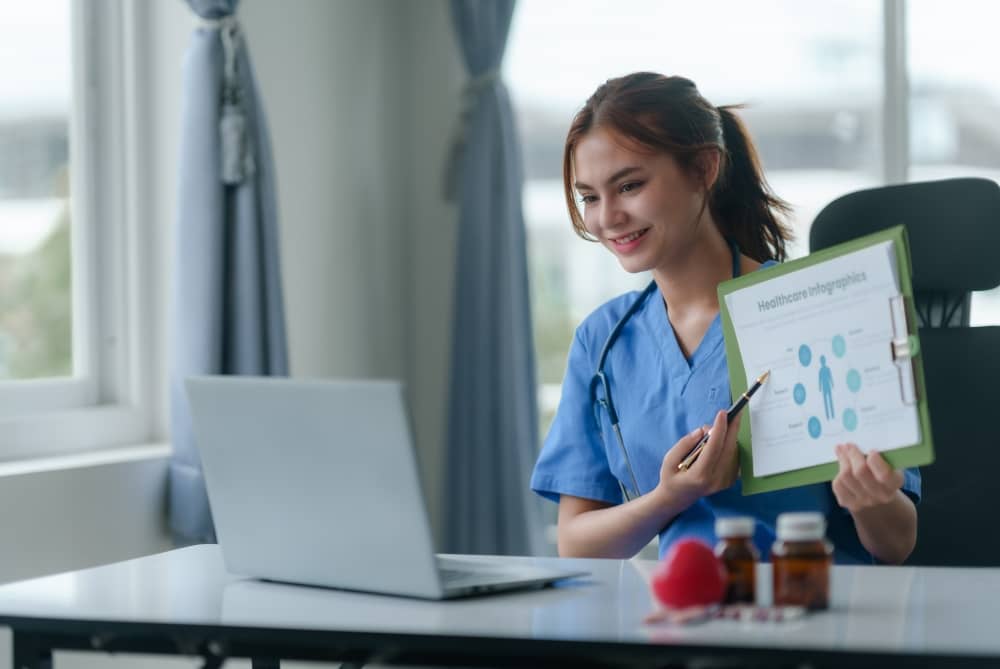If you are a healthcare professional such as a nurse, direct carer, or midwife, did you know there are a variety of expenses you may be eligible to claim on your tax return?
As a crucial part of our society, we want to help you get the maximum tax return you are entitled to.
In this guide, we’ll cover examples of what healthcare professionals can and can’t claim on a tax return to help you maximise your refund. Our goal is to get you the highest return possible and to take some of the stress out of the tax season for you.
What Nurses Can Claim
The ATO (Australia Tax Office) has specific rules about what expenses are eligible to be claimed on your tax return.
Here are the big questions to ask yourself when figuring out what you can claim as a nurse:
- Did I spend my own money on work-related items?
- Was I reimbursed for the purchase?
- Were the items I bought directly related to earning my income?
- Do I have proof/receipts of my purchases?
Here are some examples of work-related expenses you can claim as a nurse, midwife, or direct carer.
Vehicle Expenses
Certain vehicle expenses may qualify for a deduction when you lodge your tax return. Here is a general guide to what personal vehicle expenses you can claim:
- Driving your car between separate jobs on the same day (e.g. travelling from your job as a carer to a second job, even if it is in a different field)
- Patient transportation or visiting a patient in their home
- Travel between medical facilities/hospitals during your shift
- Travel to another worksite that your employer requests and does not reimburse you for
- Transporting bulky equipment as requested by your employer
To claim personal vehicle expenses, you need to keep a detailed 12-week consecutive logbook. This works out the work-related percentage that you used your vehicle for.
You can learn more about how to keep a logbook here: A Simple Guide to Keeping a Car Logbook for Tax Purposes
Occupation-Specific Clothing or Uniforms
You may be eligible to claim expenses spent laundering or dry-cleaning eligible work clothes or uniforms. Keep all receipts for any repairs or dry cleaning costs.
Self-Education Expenses
If you take a course related to your job, you may be eligible for a deduction on your tax return.
The course needs to be directly related to your current job and support an improvement in your skills or an increase in your income.
You may also be able to claim:
- The annual cost to renew your practising certificate
- Work-related conferences or seminars
- Work-related training courses
- Costs of magazines, journals, and technical or professional publications. etc. directly related to your job
Safety Equipment
If you purchase safety equipment needed for your job with your own money and do not receive reimbursement, you may be eligible to claim it on your tax return. Remember to keep your receipts.
Here are some examples you may be eligible to claim:
- Medical equipment, such as stethoscopes
- Gloves
- Lab coats or aprons
- Protective masks
- Safety glasses
- Briefcase or workbag
- Non-slip shoes
- Hand sanitiser
- Protective vests
- Rapid Antigen Tests (RATs) that you buy and use for testing and reporting your RAT status to be able to go to work
- Stockings or pantyhose
Note: Remember to keep receipts for all purchases. This list is just a guide and some items may not be eligible in certain circumstances. Working with a tax professional is the best way to ensure a completely accurate tax return that takes advantage of all the claims you are eligible for.
Phone and Internet Expenses
You may be eligible to claim a portion of work-related internet and phone usage if you are required to use a personal device for work.
Be sure to keep a one-month logbook that details personal and business use of your phone or internet.
Other Work-Related Expenses
You may also be able to claim a deduction for work-related expenses such as:
- Mobile phones or pagers (if you are on call)
- Calculators
- Professional association fees
- Union fees
- Agency fees
- Computer or laptop depreciation costs if you need your personal computer for work-related use
- FOB Watches or battery replacements
- Certificate Fees
- Overnight accommodation costs
- A portion of home office expenses if you work from home
- Stationery (diaries, pens, logbooks, etc.)
Note: These are general guidelines only. Consult a tax professional to confirm the exact deductions you are eligible to claim. Always remember to keep detailed documentation and receipts for any expense you claim.
What Nurses Can’t Claim
As a general rule, you are not allowed to claim personal expenses or non-work-related expenses.
Here are examples of expenses you cannot claim as a healthcare professional:
- Driver’s license fees
- Social or entertainment functions
- Child care
- Prescription glasses
- Contact lenses
- Personal grooming (eg cosmetics, hair products, hairdressing, cosmetics, and skincare products)
- Relocation costs
- Fines or penalties
- Mileage driven from your home to your workplace, even if you have lengthy travel time to get to your job or work outside normal business hours
- Buying or repairing regular clothing
- Cleaning plain clothes (even if you wear them at work)
- Self-education that is related to starting a new job or business

Tax Tips for Nurses, Midwives and Carers
Here are tips for nurses, midwives, and carers to maximise their tax return:
- Learn what tax deductions you are eligible for as a nurse and what expenses you cannot claim (remember, you must have purchased an item directly related to your current job, with your own money, and with a receipt or proof of purchase)
- Keep thorough and accurate records of all work-related expenses
- Keep receipts, bank statements, credit card statements, or invoices of any work-related purchases or expenses
- If you’ve been reimbursed for a work-related purchase or expense, do not claim it
- Stay up to date on current tax laws and legislation to ensure your tax return is in line with up-to-date tax laws
- Use the helpful tools in the ATO app, such as the myDeductions tool that helps pre-fill your tax form with the information you enter throughout the year
- Take pictures of any receipts and create a folder where you store them to ensure you have proof of work-related expenses so you can easily access them when it comes time to lodge your return
- Ask your employer if they offer any tax incentives or entitlements, such as salary package options or novated leasing
- We recommend lodging your tax return at the end of July — this is usually the easiest time to lodge your return and gives you plenty of time to get it completed by the deadline
- To make sure you lodge a 100% accurate return that takes advantage of every deduction you are eligible for, consult a tax professional. Working with a tax professional will give you the peace of mind that there are no mistakes on your return and that you are getting the maximum return you are entitled to.
Learn More: Should I Do My Tax Return or Hire a Tax Agent To Do It for Me?
Wondering What Expenses Qualify As Tax Deductions As a Nurse, Midwife, or Carer? Our Tax Professionals Can Help
We know tax time can be overwhelming and stressful. We’re here to tackle the hard work for you, make sure your tax return is 100% correct, and get you the maximum tax return you are entitled to.
If you are a medical professional and need help lodging an accurate, timely tax return that gets you the maximum refund possible, our dedicated team is here to help. Contact us with questions or to get started on your tax return. Email us at support@taxreturn.com.au, phone us on 0499 829 829 (0499 TAX TAX), or fill out our online contact form.


